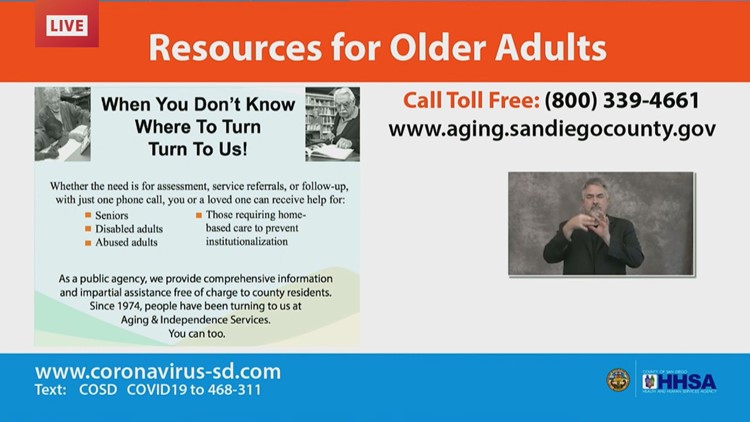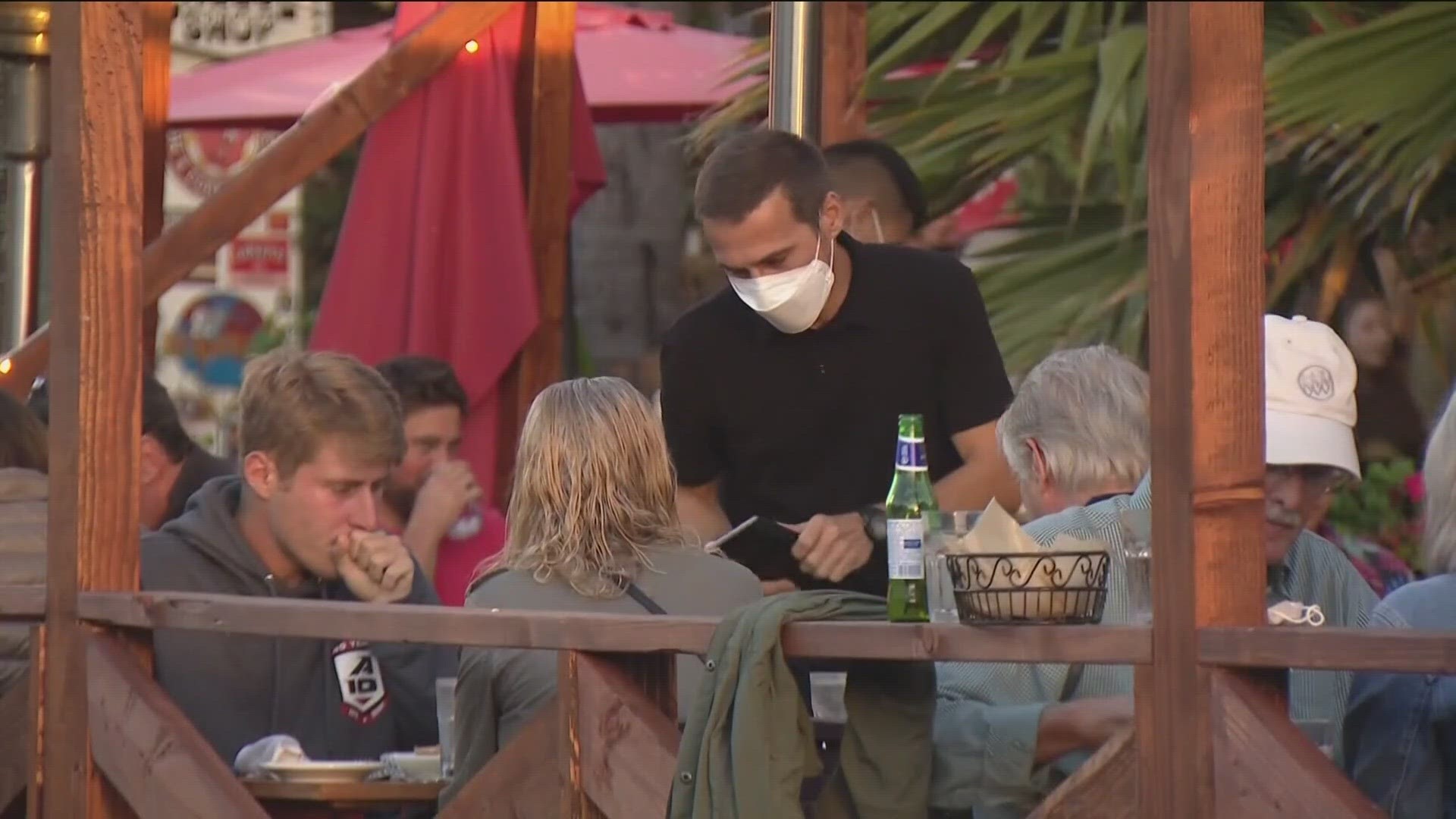SAN DIEGO — San Diego County health and elected officials provided their daily update on coronavirus Monday and sharing updated statistics on local cases along with resources for older adults in the county. San Diego County Supervisor Nathan Fletcher encouraged locals to reach out to seniors in their life to check on them, offer support and connect them with services offered by the county.
San Diego Board of Supervisors Chairman Greg Cox shared the following websites and phone numbers to help older adults and seniors in San Diego:
San Diego County Aging & Independence Services can be found online here or by calling 800-339-4661. This number can also be reached 24/7 to report suspected instances of elder or dependent abuse.
LiveWellSD.org offers resources for all ages including tips for physical fitness for older adults.
Officials also announced there are now 1,404 cases of COVID-19 in San Diego and there have been 19 deaths with no additional deaths reported since Sunday.
Starting Monday, the county will begin reporting the ethnic breakdown of COVID-19 cases.
“While we’re happy to see no deaths reported in the past day, it does not mean we won’t see additional COVID-19 fatalities. Deaths are often a lagging indicator,” said Eric McDonald, M.D., M.P.H., medical director of the County Epidemiology and Immunization Services branch. “The most effective way to keep people from getting the virus and to prevent potential deaths is by staying home and wearing a face covering while in public conducting essential activities.”
Homemade masks, bandanas, scarves and neck gaiters are acceptable, since these items can be washed and reused. Facial coverings don’t need to be used when people are at home. First 5 San Diego compiled a list of guides for making your own covering.
Supervisor Fletcher said the San Diego County Board of Supervisors will hold their weekly meeting remotely on Tuesday. He highlighted two agenda items the board will be considering.
The first is a $25-million behavioral health impact fund that was being worked on before the coronavirus outbreak, according to Fletcher. The fund would utilize money currently tied up in a lawsuit and use it to increase behavioral services. If approved the money would be available to service providers of drug and alcohol treatment, and mental health services to assist with purchasing, renovating or expanding a building.
"Given the duration and lasting impacts of the coronavirus, this is incredibly timely now in that it could provide an opportunity for an increased level of services," said Fletcher.
The second item Fletcher highlighted that the board will consider Tuesday is the appropriation of $500,000 in direct contributions to nonprofits that are ensuring food security for San Diego County residents in need.
Fletcher continued to encourage residents to visit coronavirus-sd.com/pledge to take the Stay at Home pledge. He shared a social post by the San Diego Padres' Swingin' Friar highlighting some of the ways locals are promoting the pledge.
------------------------------------
View all News 8 coverage of coronavirus / COVID-19
News 8 has joined forces with The San Diego Foundation to raise immediate, emergency funds for our most vulnerable neighbors in need. Here is how you can help.
We also have a Frequently Asked Questions page we will continue updating with the latest information and reports.
Click here to watch "Facts Not Fear," a News 8 Special on coronavirus from March 26, 2020.
BACKGROUND
According to the CDC, coronavirus (COVID-19) is a family of viruses that is spreadable from person to person. Coronavirus is believed to have been first detected in a seafood market in Wuhan, China in December 2019. If someone is sick with coronavirus, the symptoms they may show include mild to severe respiratory illness, cough, and difficulty breathing.
Currently, there is no vaccine, however, the CDC suggests the following precautions, as with any other respiratory illness:
Know how it spreads
There is no vaccine
The best way to prevent illness is to avoid being exposed to the virus
It is thought to spread mainly from person-person between people in close contact
And believed to be spread by respiratory droplets produced when an infected person coughs or sneezes
Protect yourself
Wash your hands with soap and water for a minimum of 20 seconds
If soap and water aren't available, use hand sanitizer that contains at least 60% alcohol
Avoid touching your eyes, nose, and mouth
Avoid close contact with people who are sick
Put distance between yourselves and others
Protect others
Stay home when you are sick
Wear a facemask if you are sick
Cover your cough or sneeze with a tissue, then throw the tissue in the trash
If you don't have tissue, cough or sneeze into the inside of your elbow
Immediately wash your hands after coughing and sneezing
Clean and disinfect frequently touched objects and surfaces using a regular household cleaning spray or wipe
You can find information on disinfecting and cleaning on the CDC's How to Protect Yourself page.
The California Department of Public Health has issued guidance on the use of cloth face coverings to protect against the spread of the novel coronavirus COVID-19.
The County of San Diego has made face coverings mandatory for those working with the public including grocery stores, pharmacies, gas stations, convenience stores, and similar businesses.
While officials say these face coverings are not a substitute for practices like social distancing and handwashing, there is evidence to suggest that the use of cloth face coverings by the public during a pandemic could help reduce disease transmission. Officials do not recommend the public use N-95 or surgical masks which are needed by health care workers and first responders.



